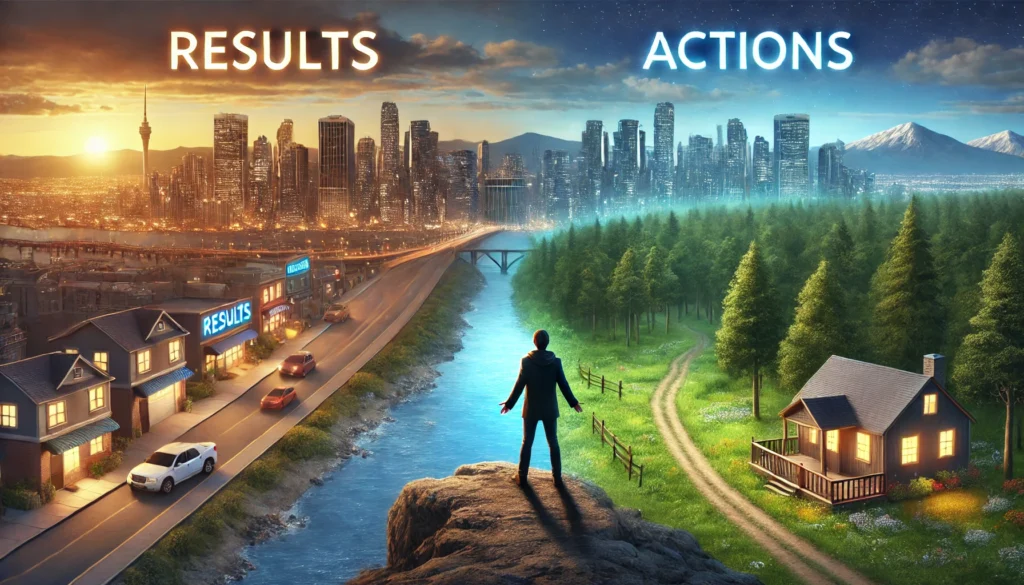The Importance of Judging Our Actions, Not Just Our Results

Table of Contents
Introduction
There is an ongoing discussion about what truly defines us: is it our actions, our beliefs and thoughts, or something else entirely? I believe that many people focus too heavily on a third aspect—results—often at the expense of recognizing the value of actions and intentions.
The trap of result-oriented success
In recent times, more than ever, we’ve been flooded with “successful” individuals showcasing their cars, mansions, and diamonds. They send a clear message—especially to men—that if you don’t have a successful business or three beach houses around the world, you’re nobody; you’re a loser; you’re lazy; you’re just the worst. I’ve fallen into these narratives myself. I thought I valued my self-worth based on my actions, but I found myself deeply affected when things didn’t go my way or when I didn’t get the results “I was supposed to get.” It’s probably equally challenging for women, though the pressures may revolve around different topics like having a family and such.
Santiago Bilinkis’ Insightful Example
I recently saw Santiago Bilinkis discussing this topic, and he provided a perfect example:
- Scenario One: You had an exam, didn’t study much, and ended up getting a 10 or an A+ grade. Does that make you a good student? A hard worker? No, of course not. You didn’t study; you might have gotten lucky. You were lazy and should have acted differently, regardless of the result.
- Scenario Two: You studied for weeks, gave your absolute best, but didn’t pass the exam. Does that make you a failure? Lazy? No, it makes you a person who studied hard, was disciplined, and didn’t get the expected result. Now is the time to apply some Hansei techniques—a Japanese practice of self-reflection—to evaluate what happened, learn, and create steps to improve in the future.
Life is about making the right decisions and understanding that, even then, things can go wrong. What truly defines us is how we act and respond in these situations—not just the outcomes we achieve.
The Challenge of Valuing Actions Over Results
It’s hard to embrace this belief system because, after all, other people don’t see our actions; they only see our results. So we can fall into the trap of thinking that what defines us is our results because, at the end of the day, that’s how other people will judge and define us.
We currently live in a society obsessed with metrics and visible achievements. It’s easy to internalize external judgments or judge ourselves by comparing ourselves with what other people post on Instagram. Social media platforms amplify this by allowing people to showcase their successes while hiding their struggles and efforts. This creates a distorted reality where results overshadow the hard work and determination that lead up to them. How many people show amazing trips all the time but have huge credit card debt that only they know about? This is just one example, and then we blame ourselves for not being as “successful” as them or traveling as much.
On top of that, I believe most people don’t have a clear vision or fully understand their own passions and what truly fulfills them. It’s easier to pursue someone else’s dream than to stop, introspect, and find our own. Study medicine because your parents wanted you to. Build a startup because that’s what a guy with a Lamborghini told you online. We do this because the other option involves introspection and confronting our own shadows and traumas, as Jordan B. Peterson and Robert Greene perfectly explain in their books and talks. What I’m trying to say is that, on top of the usual problems related to people focusing on results for the reasons discussed previously, many people don’t know themselves or their passions. They’re trying to achieve someone else’s dreams and results with unrealistic deadlines.
Teaching Future Generations the Right Values
Going back to what Santiago Bilinkis was saying, something I want to point out is that his speech started by saying there are two things he wanted to teach his kids, and one of them was this. I think it’s important to teach our children and future generations that grades and results don’t matter as much as our actions and decisions do. To continue with his example, we should stop rewarding our kids if they get a good grade and instead praise them for spending quality time studying and focusing on the task at hand, no matter the result.
My Personal Journey Towards Valuing Actions
I’m currently in the process of unlearning my old ways of thinking—that results define us—and adopting a new, healthier, and more meaningful belief that our actions define us. It’s hard to unlearn and to stop focusing on something so emphasized by our society, but I know it’s the right decision and the best way to avoid getting depressed when things don’t go as I want. Because if we think our results define us, then our value as a person is also determined by our results. What happens then when things don’t go our way? Are we worse people because of that? Of course not! I’ve been punishing myself for not being where I “was supposed to be” even though I did everything right. I’m proud of my decisions, and I don’t regret anything.
How is it possible that, upon reflecting on my life, I see so many right decisions, so much learning, and so many moments that make me proud of myself and what I’ve been through, yet I still feel depressed and worthless because I’m not getting the right results?
Embracing a New Perspective
Understanding that our actions and decisions define us, rather than just our results, is a profound shift in perspective. It’s a journey of self-discovery and self-acceptance. By focusing on our efforts and the integrity of our actions, we can find fulfillment and self-worth that isn’t dependent on external validation or outcomes.
This doesn’t mean we should disregard results entirely, but rather place them in proper context. Life is unpredictable, and sometimes, despite our best efforts, things don’t turn out as we hope. Recognizing the value in our journey allows us to navigate these challenges with resilience and grace.
Moving Forward
To fully embrace this mindset, I’ll be taking the following steps, please consider taking them as well if you struggle with the same:
- Practice Self-Compassion: Acknowledge your efforts and forgive yourself for setbacks. Understand that everyone faces challenges, and it’s okay not to have everything figured out, nobody does.
- Reflect on Your Values: Spend time identifying what truly matters to you. This will help align your actions with your authentic self, rather than chasing external markers of success.
- Understand your intrinsic self-worth: A great way of not putting all our self-worth in our results is to know what gives ourselves valuable to ourselves no matter what. It could be our intelligence, the way we do something or anything we value from ourselves. In my case, it’s my resilience, how I get up and keep going every time I fall and things don’t go my way. Knowing this will help you keep going even in your worst moments. It has to be something that doesn’t shift no matter what and that you value no matter what.
- Set Process-Oriented Goals: Focus on goals that emphasize the process over the outcome. For example, commit to learning something new every day rather than aiming for a specific achievement.
- Limit Comparisons: Remember that social media often portrays a curated version of reality. Try to minimize comparisons with others and appreciate your unique journey. Maybe even uninstall social media platforms altogether if it really affects you.
- Seek Support: Don’t hesitate to reach out to friends, family, or professionals who can offer guidance and encouragement as you navigate this shift in perspective.
Conclusion
By redefining success as a measure of our actions and intentions rather than solely our results, we can cultivate a healthier relationship with ourselves. This shift not only alleviates the pressure of external expectations but also fosters a deeper sense of fulfillment and purpose. It’s a challenging path, but one that leads to genuine self-worth and a more authentic life.





